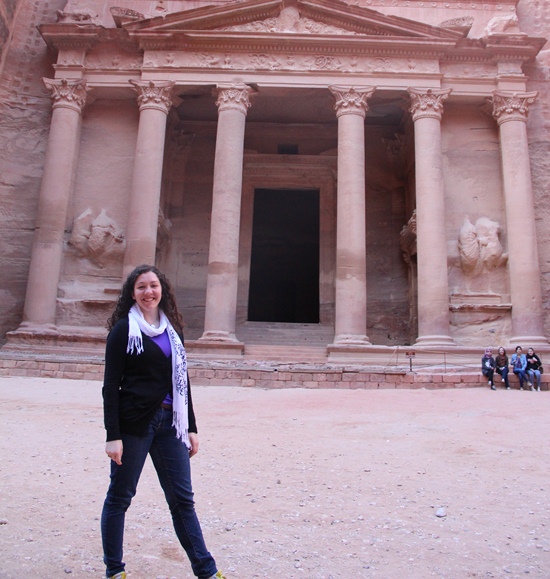Promises and Limits: Women in Jordan

Promises and Limits: Women in Jordan
It’s been three and half months since I arrived in Irbid, Jordan and I can’t begin to express how much I’ve learned. Some of the most important parts of my time here have been spent getting to know women in Jordan and learning about their lives: their goals, aspirations, and the struggles they face.
Part of my program is that we all take a language pledge to speak only Arabic during our time here, which has forced me to express myself in a different way and has taught me so much about intercultural communication. But even though I’ve spent a good bit of time here, I still constantly find myself questioning everything from vocabulary to why it’s considered impolite to cross my legs in church (yes, I found that out the hard way).
When I had questions for the women in Jordan who I know about how they balance their careers, religions and families, they were happy to oblige.
Although traveling and working abroad is tough for many Arab women, she said that her family is very supportive and wants her to have the opportunity to do what she wants.
My roommate, a sophomore like me, is incredibly smart and absolutely hilarious. We’ll call her Beth for now. She’s Christian and is currently studying accounting. Another sophomore friend in the same grade, Mary (not her real name) studies French and is quite religious but does not don the hijab like many of her peers.
I also have the privilege of working with a law graduate student for my independent study, and she (Liz) is a lovely and brilliant muhajaba (girl who wears a hijab) who has been very encouraging and helpful with my work this semester.
After graduating from Yarmouk, Beth plans to go right into a master’s program in accounting, continuing her time in school. After that, she wants to travel and work in a bank somewhere, perhaps in Dubai. Although traveling and working abroad is tough for many Arab women, she said that her family is very supportive and wants her to have the opportunity to do what she wants.
She agrees that the culture is tough on many women, but said that having a supportive family makes all the difference.
She agrees that the culture is tough on many women, but said that having a supportive family makes all the difference.
When talking about her mom, she always mentions how the progression of women’s rights has been sort of strange in the past 50 or so years. Obviously the opportunities open to them have changed quite drastically, but the dress code has done the reverse of what we might consider to be freeing. The generation before us can remember a time when most people did not wear the hijab, and the dress code was much more lenient than it is now.
Mary is currently applying to study abroad programs in France for next year or the year after. Her goal is to become very good at French and then hopefully work there after graduation. She agreed with Beth that the most important part of her plan involves her family support. She knows that when she leaves, she will miss her family terribly. Right now, she sees them every weekend and really appreciates that.
She, too, agreed that women’s rights have had a substantial increase from what they were in the past. One thing she said that was really important now was that families have less control over whether or not their girls got an education; now everyone has that right. She said that in the past, some families would take their girls out of school between ages 13 and 16, and marry them off. This happened to her grandmother, who was taken out of school after the 10th grade.
While the source of pressure in people’s lives differs somewhat, it seems to me that young people do the same thing everywhere: they balance their dreams and aspirations with the culture and influences in their lives.
After having five children, she returned to school on her own prerogative and with the support of her husband. She went on to complete her bachelor’s degree in education and obtain her teaching certificate.
Liz has a tough choice ahead of her. She wants to get a doctorate degree in law, and teach in a university, hoping to make changes to the law and/or its interpretation. However, she cannot get the degree in Jordan–or she can, but the programs here are not considered very strong. However, in order to study abroad, she must travel and live with a man from her family. Or, she must marry someone who will agree to go with her.
She told me she doesn’t like talking about it, because she’s really not sure what she is going to do. Currently she is not thinking of marriage, and there is no one in her family who could go with her.
All of these women have really helped me to see how complex the culture is. And how many different influences and pressures both women and men feel, much like in America. While the source of pressure in people’s lives differs somewhat, it seems to me that young people do the same thing everywhere. They balance their dreams and aspirations with the culture and influences in their lives.
Promises and Limits: Women in Jordan
Related Reading
- 5 Things that Surprised Me about Living in Amman
- Dinner in the Desert: A Bedouin Zarb in the Wadi Rum, Jordan
- Travel Jordan: The Real Deal with Jo Brown
- A Steamy Encounter in Wadi Musa, Jordan
- Finding Salaam in Amman Jordan
- Storytelling in the Wadi Rum, Jordan
- Travel Jordan and Egypt: The Real Deal with Kathy Gruver
- Travel Jordan: Jordanian Culture, Customs and Cuisine
- 8 Things to Know When Traveling to Amman Jordan
- 6 Things I Wish I Knew Before My Jordan Trip
- Jordanian Food Culture: Everything You Need to Know
Have you traveled to Jordan? What were your impressions? Email us at editor@pinkpangea.com for information about sharing your experience and advice with the Pink Pangea community. We can’t wait to hear from you!

Promises and Limits: Women in Jordan photo credits: Kate Maffey and unsplash.com. Learn about Pink Pangea Writing, Hiking, and Yoga Retreats.








